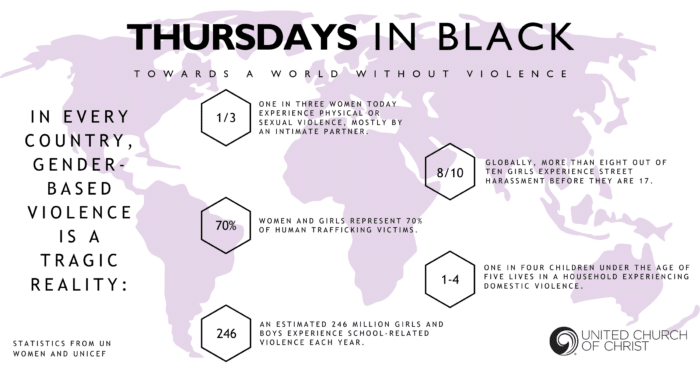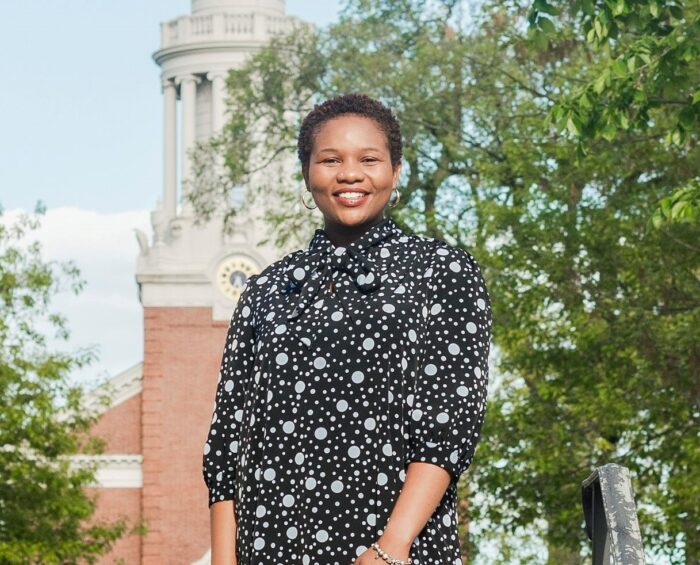Worship resources support making change, ending violence against women
It’s a pandemic within a pandemic. Violence against women and girls has intensified with COVID-19, so much so that the United Nations refers to it as “the Shadow Pandemic.”
As COVID-19 cases tax health services, other essential services — like domestic violence shelters and help lines — are at capacity, U.N. research shows, noting that “more needs to be done to prioritize addressing violence against women in COVID-19 response and recovery efforts.”
It’s violence that will take a global collective effort to quash. That’s why the United Church of Christ is engaged in the Thursdays in Black campaign. It’s also why this year the UCC is offering liturgical resources for Thursday, Nov. 25, the International Day of Elimination of Violence Against Women.

“The International Day of Elimination of Violence Against Women is a day that reminds us of the need for advocacy and awareness within the global spaces we occupy to bring about significant change,” said the Rev. Karen Georgia Thompson, associate general minister for Wider Church Ministries. “The resources being developed are an important part of the movement to eliminate violence against women and they invite our churches to participate in meaningful ways that will bring about change.”
‘Acknowledge pain first’

Essence Ellis, a former Council for Health and Human Service Ministries Scholar and the first-ever recipient of the CHHSM and Justice and Local Church Ministries United Church of Christ Fellowship, compiled the liturgical resource. In her work to become a leader at the intersections of theology, public health, racial and gender justice, she felt compelled to mark this day on the liturgical calendar.
“A lot of our conversations around violence against women are deeply rooted in a sense of forgiveness,” Ellis said. “But one needs to acknowledge pain first. A theological approach is very necessary and in our faces. Christ spoke about the women, the children, the widows. It’s emotionally challenging to speak about violence and to create the space where women are comfortable. We need to prioritize that.”
Given the opportunity in her work to decide which commemorative event she wanted to create resources for, “this was the one I felt the deepest call for. I had read over the summer the impact that COVID-19 was having on domestic abuse victims and it felt important that congregations have resources to engage with topic.”
“This liturgical resource is an expression of the longstanding partnership that CHHSM has had with Wider Church Ministries to raise awareness about this critical issue,” said the Rev. George Graham, CHHSM vice president. “Ending violence against women is essential as we seek to realize CHHSM’s vision of together creating a just, caring and compassionate world.”
The role of hands
The service calls on participants to acknowledge the violence inflicted on women around the world. “We must use our voices to support women who have survived violence and offer our platforms to uplift their narratives in hopes of building a more just world for the girls and women in our communities as well as those who will come after us,” the resource narrative notes.
“My general goal was to use language that named what the issue is (violence against women) and who/what is being centered in the liturgy (women and their healing/protection),” Ellis said. “I wrote most of the liturgical elements and prayers myself but my favorite part is the call and response adapted from ‘For Colored Girls Who Have Considered Suicide / When The Rainbow Is Enuf,’ by Ntozake Shange. The idea of ‘a layin’ on of hands’ felt necessary to name, especially when considering the trauma women experience when they suffer violence is by someone else’s hand.
“But when Shange refers to it, she’s reflecting on a deeply spiritual and communal practice; this layin’ on of hands is gentle, healing and intentional. Starting the liturgical resources with this call to worship sets the tone for how a congregation can move forward in a worship service that centers the elimination of violence against women.”
‘Call and conviction’
Ellis has created the resource to be evergreen; she hopes the liturgy will be reused and revisited. She also wanted to emphasize the intersectionality of violence against women in the resource and how social economic status matters. Violence impacts some women more than others — among them, Native women, and trans-women.
“I hope users will take away a sense of call and conviction to really examine what our congregations are holding and caring for and who our congregations are uplifting,” Ellis said.
“There are multiple congregations in ministry with women who have experienced domestic violence and whose priority is making change that is impactful and resonates the love of God and response to the cries for justice,” Thompson said.
The International Day of Elimination of Violence Against Women begins 16 days of advocacy to end gender based violence. As part of the UCC’s membership in the World Council of Churches, Wider Church Ministries is offering a guide for those 16 days of activism, along with a social media toolkit. More tools, like the liturgical resource, for churches and congregants to use to lift up the vulnerable women in their community and the world.
“I hope these resources will be used to help the women who need it,” Ellis said. “These resources are for them. When writing and gathering these elements they were my intended audience. I use a lot of plural first person through out the resources because I want people to know that we’re all accountable here. We, beloved community, all play a part in protecting women and making environments that are safe for them to heal and thrive.”
The worship resources are available here on the Wider Church Ministries Just World For All virtual calendar.
Related News
A Prophetic Call for Justice and Peace in Palestine
The executive leaders of the United Church of Christ have issued the following statement...
Read More‘Love is Greater Than Fear’: Regional Youth Events get to the heart of gospel message
United Church of Christ teens attending this summer’s Regional Youth Events (RYE) are...
Read MoreUCC desk calendars available to order now
Prepare for your day, month and year with the United Church of Christ desk calendar —...
Read More


